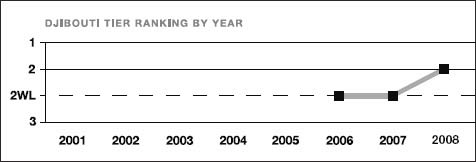Trafficking in Persons Report 2008 - Djibouti
| Publisher | United States Department of State |
| Author | Office to Monitor and Combat Trafficking in Persons |
| Publication Date | 4 June 2008 |
| Cite as | United States Department of State, Trafficking in Persons Report 2008 - Djibouti, 4 June 2008, available at: https://www.refworld.org/docid/484f9a1137.html [accessed 13 October 2022] |
| Disclaimer | This is not a UNHCR publication. UNHCR is not responsible for, nor does it necessarily endorse, its content. Any views expressed are solely those of the author or publisher and do not necessarily reflect those of UNHCR, the United Nations or its Member States. |
DJIBOUTI (Tier 2)
Djibouti is a source, transit, and destination country for women and children trafficked for the purposes of commercial sexual exploitation and domestic servitude. Large numbers of voluntary economic migrants from Ethiopia and Somalia pass illegally through Djibouti en route to the Middle East; among this group, a small number of women and girls fall victim to domestic servitude or commercial sexual exploitation after reaching Djibouti City or the Ethiopia-Djibouti trucking corridor. A small number of girls from impoverished Djiboutian families may also be exploited in prostitution as a means of income, in some instances under the auspices of traffickers. Prostitution in Djibouti occurs in apartments, brothels, and on the streets; members of foreign militaries stationed in Djibouti reportedly contribute to the demand for women and girls in prostitution.
The Government of Djibouti does not fully comply with the minimum standards for the elimination of trafficking; however, it is making significant efforts to do so. In 2007, Djibouti demonstrated commitment to addressing human trafficking through the drafting and passage of a comprehensive antitrafficking statute.
Recommendations for Djibouti: Enforce the newly enacted anti-trafficking statute through the successful prosecution of traffickers; further educate all levels of government officials and the general public on the issue of human trafficking; and establish mechanisms for providing increased protective services to trafficking victims, possibly through the forging of partnerships with NGOs or civil society organizations.
Prosecution
During the reporting period, the Government of Djibouti paved the way for the future prosecution of traffickers through the passage of an anti-trafficking statute, though no prosecutions or punishment of traffickers occurred during the last year. In October 2007, the President of Djibouti and the Council of Ministers approved a Ministry of Justice-drafted comprehensive anti-trafficking law and presented it to the National Assembly for debate and adoption. The law was passed by the National Assembly in early December and the President signed it into force later that month. Law 210 "Regarding the Fight Against Human Trafficking" covers both internal and transnational trafficking and prohibits all forms of trafficking in persons. It protects victims regardless of ethnicity, gender, or nationality, and prescribes penalties of up to 30 years' imprisonment for traffickers. At the conclusion of the reporting period, the provisions of Law 210 had only been in force for three months and have not yet been used. However, the government throughout the reporting period continued to punish child sexual exploitation by charging the accused as sexual offenders. A French national, who fled Djibouti after being convicted of sexually exploiting two boys, was recaptured by police upon returning to the country and sent to prison. In addition, the Attorney General's office announced the opening of an investigation into a child sexual exploitation network dating back to the 1990s. Throughout the year, Djibouti's Brigade des Moeurs (Vice Police) conducted regular sweeps of the capital city after dark and preventatively detained 178 Ethiopian and Somali minors suspected to be exploited in prostitution. Djiboutian police monitored bars and neighborhoods in Djibouti City, detaining suspected pimps and children in prostitution; specific information regarding the punishment of pimps was not provided, although the police indicated that most prostitution occurred without the involvement of a pimp. The government did not provide any specialized training for government officials in trafficking recognition or in the provision of assistance to trafficking victims.
Protection
With few resources itself and a very small pool of local NGOs, the government has few options for meeting the needs of children exploited in prostitution. Past alleged incidents of involvement of international NGO staff members in child sexual abuse have hampered the government's cooperation with international NGOs. Minors detained by police on suspicion of involvement in prostitution were generally held in custody for several days in quarters at the Police Academy set aside for this purpose. Police doctors provided these girls' medical care, and the Director General of the Police personally spoke with each detained minor to determine the origin of the child. During this time, police attempted to locate parents or other family members in Djibouti or the home country, and minors were generally released to family members or deported without charge. No specific data on detained Djiboutian minors was provided, but police reported that such children were released to family members. The government does not offer legal alternatives to the removal of foreign trafficking victims to countries where they face hardship or retribution. Authorities do not encourage victims to participate in investigations or prosecutions of traffickers.
Prevention
There is nascent and growing understanding of human trafficking within the Djiboutian political hierarchy. The Council of Ministers' approval of the anti-trafficking draft law was heavily publicized, and dominated the entire front page of the country's only daily newspaper, which is government-run, sending a clear message to both security forces and citizens of the government's intent to combat human trafficking. NGOs and the government-run orphanage for girls reported greater levels of government collaboration in providing assistance to street women and children, most of whom are foreign nationals and at risk of trafficking. Police verbally warned bar and night club owners that permitting child prostitution on their premises would be punished. In an effort to reduce the demand for commercial sex acts, in April 2008, the government issued international arrest warrants for five French nationals based on allegations of child sexual abuse.

